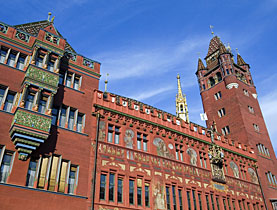Basel’s heart ticks to industry and culture

Basel is home to Switzerland's biggest stadium, but it is also where culture and the chemical industry – not to mention three countries – meet.
When you arrive in Basel from the south, the first thing that strikes you is its industrial dimension. Names that are known around the world look down on you: Novartis, Roche, Ciba, Syngenta…
If you follow the Rhine to Basel, you see a port with docks and containers. It reminds you that the city owes much of its development to the shipping trade, as Switzerland’s only “access” to the high seas and homeport of Swiss merchant shipping. Look to your left and it’s France. Look to your right, and it’s Germany.
“Basel is fortunate to be part of a European triangle, an idea I find rather appealing,” says Romansh specialist Chasper Pult. “Where I lived as a child in canton Graubünden, I could see where Italy, Austria and Switzerland all met.”
Ethnologist Jacques Hainard says Basel has always been able to get the most out of its relations with its neighbours. Perhaps the most visible symbol of this cooperation is Euroairport, which serves three countries and is managed by France and Switzerland.
For Hainard, another consequence is less tangible. “Basel is more open to other cultures, especially when it comes to languages. The city is closer to French speakers than Zurich, where the preferred languages besides German are English or Spanish.”
For comedian Emil Steinberger, Basel is a place where he feels welcome. “People there are very open, who talk readily and are happy,” he says.
Renaissance hotspot
The city does have a reputation for lightness – perhaps due to its famous Carnival – not often found in German-speaking Switzerland.
“The people of Basel know how to have fun,” says Steve Lee, singer for Swiss rock band Gotthard, who contrasts that with the serious side of the city, with its chemical and pharmaceutical multinationals.
For Chasper Pult, the Carnival celebrations aren’t just for the benefit of tourists, but a time when the locals really let their hair down. “Visitors can keep on coming, it won’t mean a thing. The Carnival really belongs to the locals,” he says.
Lee likes to point out the differences between the picturesque old Basel and the modern part of the city. Modern architecture and art are two of its calling cards, but its cultural influence has been felt for centuries. Basel University, founded in 1460, is Switzerland’s oldest, and a Renaissance hotspot.
“Basel is a rich city that has always had funds for culture, but it also has a real cultural bent,” Pult says. “The museums have an abundance of items in their collections, and donors have played an important role. Other cities haven’t been as extraordinarily lucky.”
And for Hainard, Basel knows what it wants. “You have history, culture and business there,” he says. “People know what it takes to get a deal done.”
swissinfo
Built on the Rhine in northern Switzerland, on the border with France and Germany, Basel has 187,000 inhabitants. The transnational area in and around the city is home to about a million people.
Basel’s economy has long been based on the chemical and pharmaceutical industries, although bankers have also made their presence felt.
Life sciences have made an impact in recent years, with the trinational Biovalley that runs from Basel to Strasbourg.
The recent St Jakob’s Park stadium, home to FC Basel, was opened in 2001 and can hold 42,500 spectators since its extension in 2005, making it the country’s biggest stadium.
Three first round matches will be played there:
Switzerland-Czech Republic (opening game, June 7)
Switzerland-Turkey (June 11)
Switzerland-Portugal (June 15)
Two quarterfinals will also take place there on June 19 and 21.
A fan avenue will cross the centre of the city stretching from the German Badischer railway station to the Swiss Federal Railways station. It will include access to Uefa fan zones. Another zone will be set up in the town of Liestal outside Basel.

In compliance with the JTI standards
More: SWI swissinfo.ch certified by the Journalism Trust Initiative
You can find an overview of ongoing debates with our journalists here. Please join us!
If you want to start a conversation about a topic raised in this article or want to report factual errors, email us at english@swissinfo.ch.